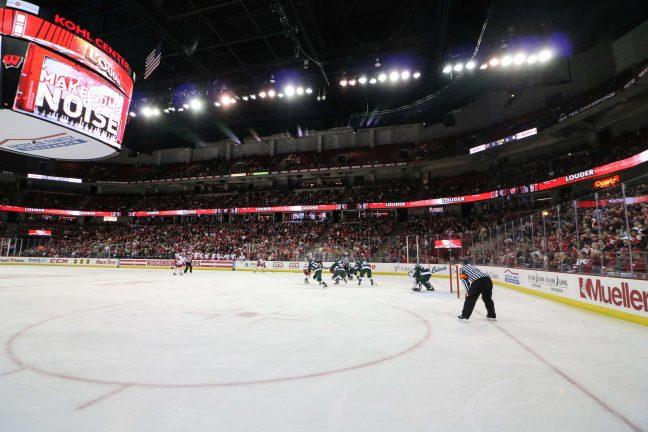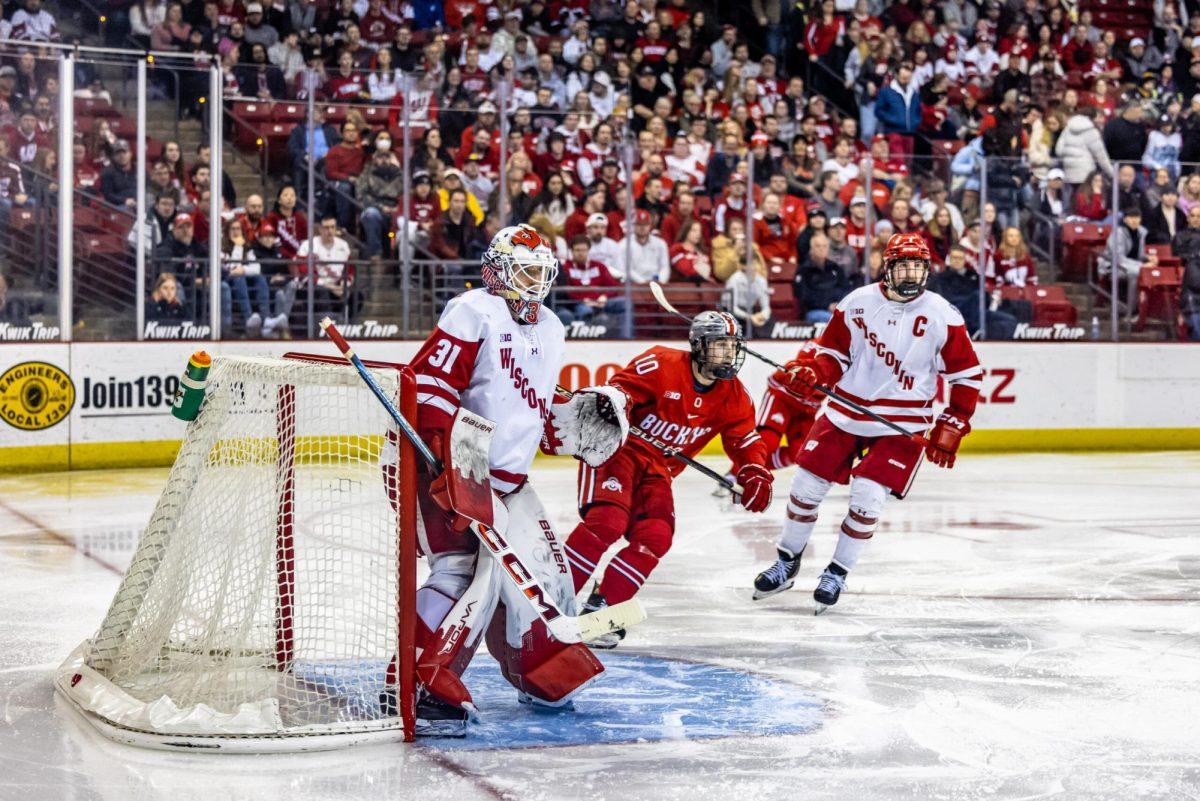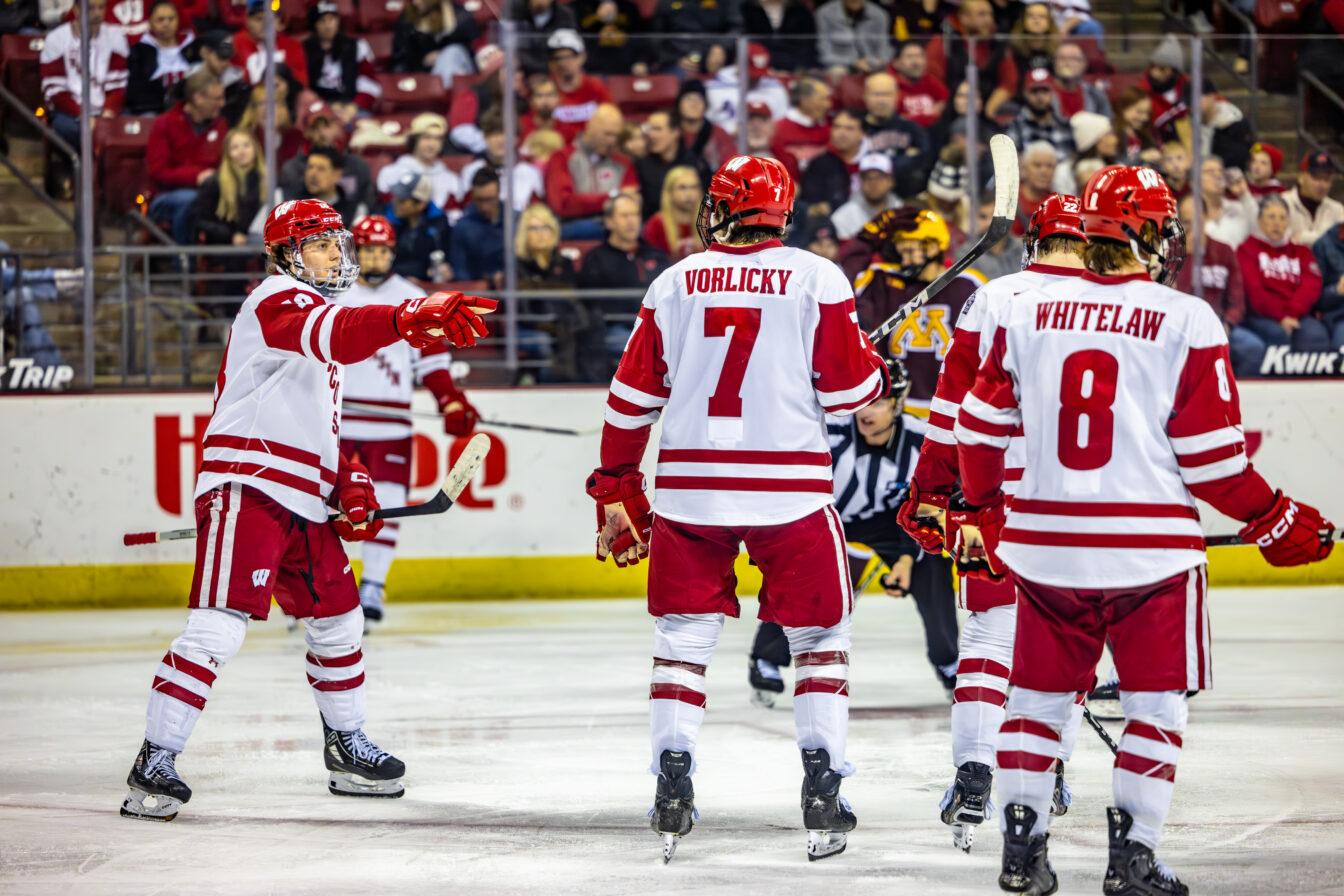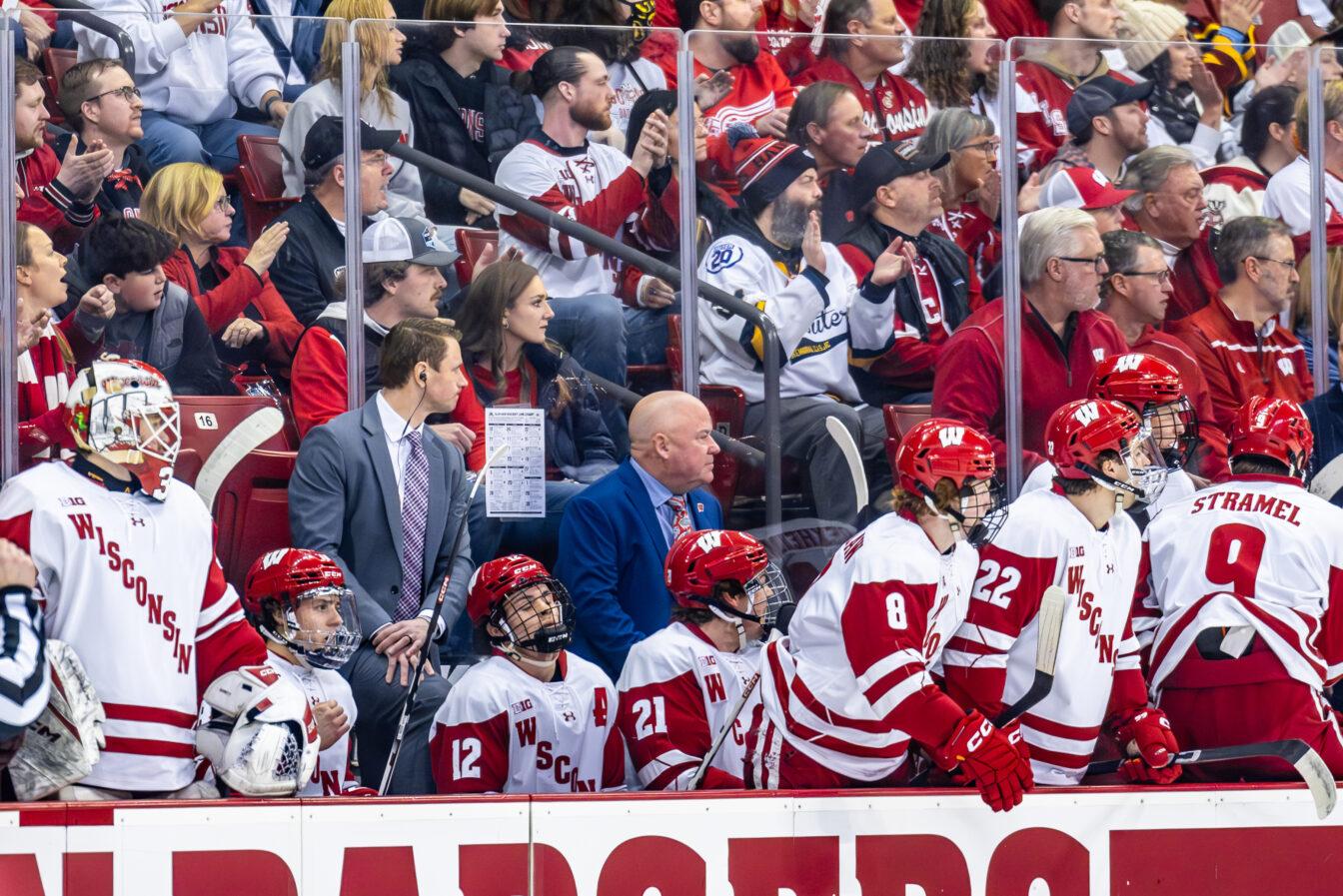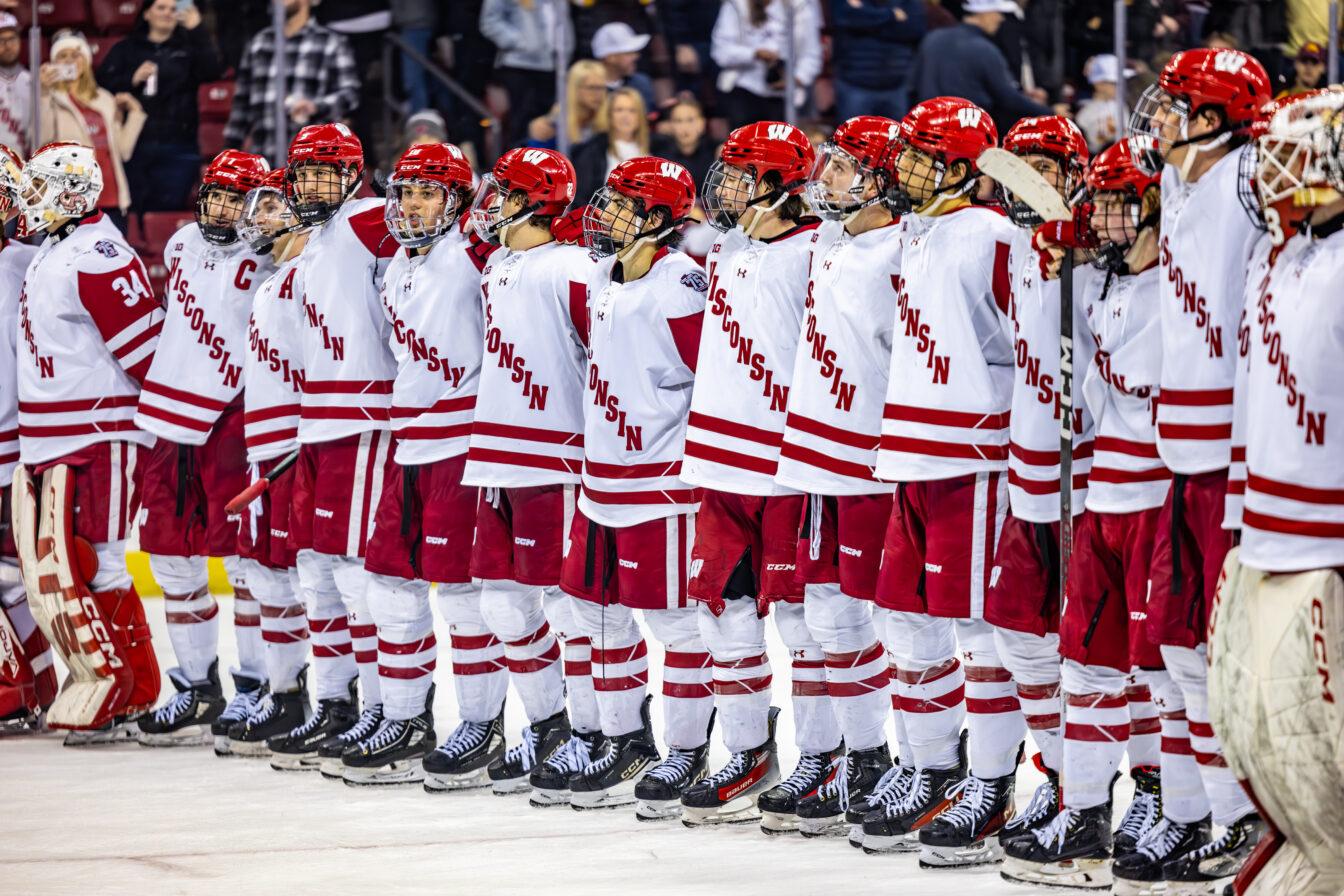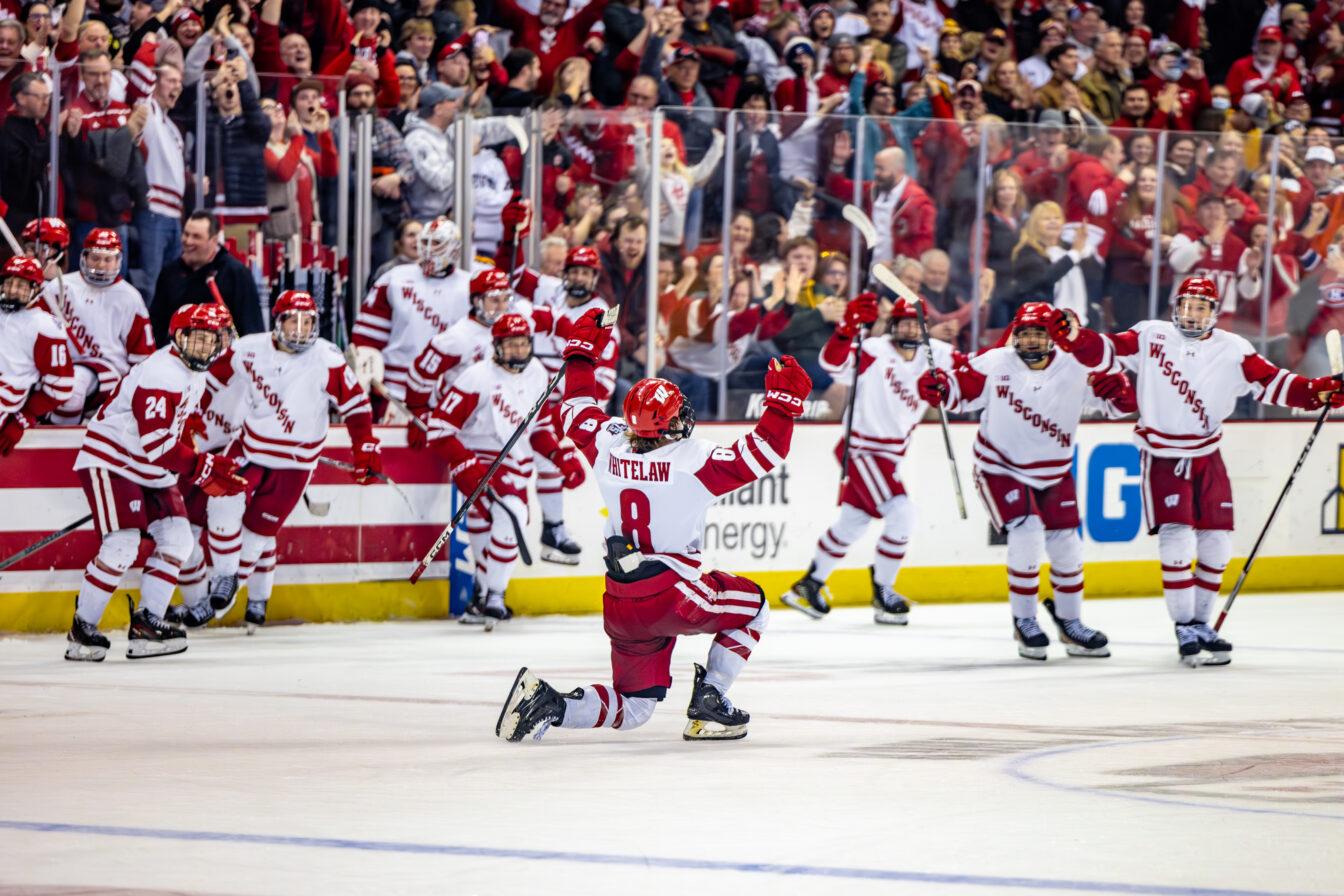It was a disheartening season for the University of Wisconsin men’s hockey team. A year after winning the Big Ten regular-season title and securing a number one seed in the NCAA Tournament, they limped to the finish line with a 10-24-3 record. Their six conference wins tied for the fewest in the Big Ten.
But this was a young group. It was — for all intents and purposes — a rebuilding year.
That didn’t mean expectations were lower.
Most preseason polls had Wisconsin ranked, with many placing the Badgers inside the top 15. While not nearly as talented as the team from a year ago, this year’s squad had plenty of ability and promise. There was a lot of bad, but still plenty of good from this year’s squad.
Here are my season-end grades and awards from this year’s team.
Forwards
Where to start? It wasn’t exactly a thrilling group of attackers this season. Brock Caufield was pretty good at the beginning of the year, and Mathieu De St. Phalle was great for a stretch toward the end of the year — but Wisconsin lacked the consistent scorer that all good teams have.
De St. Phalle led the team in goals with 10, which is far from an exciting number. Only three forwards had more than five goals.
One compliment for this group is that they played hard and physically. They liked going to the hard-to-get-to places, but once they got there, the scoring touch evaded them.
I’m still very high on De St. Phalle. He had a really good second half of the season and showed signs of improvement game by game. De St. Phalle has the potential to be a 20-25 goal scorer in college hockey, and I’m not sure he’s far off from it right now.
Still, overall, this was an underwhelming group.
Grade: D-
Defense
The defenseman were up-and-down in a big way. In some games, they showed up and dominated. In others, they got completely outplayed. While I think the goals against were inflated from what was generally a decent group, they weren’t one of the conference’s best by any stretch of the imagination either.
Injuries really hurt the back end as almost every significant player missed some sort of time.
Corson Ceulemans was pretty good overall, but for the most part, he didn’t look like the first-round pick that he is. While he has plenty of talent and is still deserving of his high draft pick, there were still games where he was lost, especially early in the season. While that can be attributed to growing pains as a freshman, these mistakes kept coming late into the season, which was a bit frustrating to see.
Anthony Kehrer and Tyler Inamoto were consistently solid yet again, but their inability to generate offense was something that was seriously missed by this team.
Outside of Ceulemans, there was an extreme lack of offensive ability for the blueliners. Ceulemans tied for the team lead with 22 points, the next closest defenseman to this number was Jesper Peltonen with seven.
All-in-all, this group of blueliners was average, or a little above average defensively, but their lack of skill offensively really hurt a short-handed team. While a lot of their struggles can be attributed to the inconsistency of pairings and injuries, this group certainly left something to be desired.
Grade: C+
Men’s Hockey: Former Badgers goaltender Cameron Rowe announces transfer
Goaltending
Goalie play was supposed to be the strength of this year’s team. Cameron Rowe was excellent a season ago, and one of the biggest reasons for that team’s success. Then, the Badgers hit the transfer portal and brought in Minnesota transfer Jared Moe.
Going into the year, this was arguably one of the best tandems in the college game. But it became immediately clear that Rowe was not the same as he was last season. His .861 save percentage took a huge drop from where it was last year. Rowe was actively bad for the most part, and he paid for it, going nearly two months in between appearances in the middle of the year.
Moe, on the other hand, was somewhat of a revelation for Wisconsin. While his numbers or record don’t exactly jump of the page, he faced almost 30 shots per game — an incredibly high number. He single-handedly won Wisconsin games quite a few times this season. It was a very impressive season for Moe, especially considering that he started the season as the back-up and played behind a shaky at best defense.
While Rowe wasn’t great, Moe was pretty good. Ultimately, Moe rightfully deserved the starting job, and he ran with it. He kept the Badgers in quite a few games that they had no business being in.
Grade: A-
Power Play
There isn’t a whole lot of good that can be said about the power play this year. It was messy and discombobulated from game one, and it never got better. The injuries turned into inconsistencies, and there was never any confidence or order with the group on the man-advantage.
Wisconsin’s slightly below average conversion percentage of 17.8% ranked 34 in the nation, but it seemed to be a little uglier than the numbers suggest. Roman Ahcan scored four of his five goals this season on the power play to tie for the team lead with Ceulemans and De. St Phalle.
A powerplay needs a guy to take the lead and run the offense, but this year’s squad, for the most part, lacked that.
Ceulemans frequently took the driver’s seat on the powerplay and showed flashes of his ability to do just that. I believe he will mature into this role even more in his college and pro career, but there were too many mistakes out of him and the rest of the top group to get anything consistent going on the man up.
Grade: D
Penalty Kill
Like the powerplay, the penalty kill also left something to be desired. Opponents scored on 29 of their 103 man advantage attempts, for a conversion percentage of 28.2% — good enough for fourth-worst in America.
It certainly did not help that Wisconsin had series against three of the top five teams in terms of powerplay percentage, but the disorganization was not limited to those games.
A big problem for this crew was the lack of a shutdown defenseman. Like on the power play, the Badgers didn’t have a guy that could run the show defensively when down a man. Special teams were arguably the biggest weakness for this year’s team, and it certainly cost them a few games.
Grade: D-
Freshmen
Zach Urdahl, Daniel Laatsch, Corson Ceulemans, Brayden Morrison, Jake Martin, Caden Brown and Liam Malmquist showed promise of an exciting future this year.
In mostly limited roles, these guys were some of the most impressive players on the team. Ceulemans has gotten most of the attention for this year’s class, and rightfully so, but the importance and improvement of the other six young players were great to see.
None of these players were overly special, but they all played solid minutes and gave Tony Granato a reason to be optimistic about the next couple of years.
Grade: B+
Men’s Basketball: Badger’s scoop up former UW-Green Bay guard Kamari McGee in transfer portal
Coaching
I was hard on Tony Granato at the beginning of the year. Perhaps too hard.
Ultimately, I’m not sure how much more he could have done with this year’s group. That’s not a shot at the players or the development, but in the end, a year of struggle shouldn’t be surprising after losing almost every major contributor from one of the best teams in school history.
It was clear that the players continued to fight in every game, and that definitely means something. I like what Granato has lined up for the future, and he deserves at least another year or two to see how these pieces that he’s recruited pan out.
While there isn’t as much life around the program as there used to be, all is not lost on the Granato era just yet. Granato and his staff are certainly in “prove it” mode, but the fight his team showed in a year that was extremely underwhelming shows the group remains bought in to their coach.
Grade: C+
Most Valuable Player: Brock Caufield
While the stats didn’t exactly jump off the page this year for the older Caufield brother, the senior had yet another solid season in the cardinal and white.
I was impressed with his willingness to do everything and step into a much larger role than he had held in previous seasons. Caufield drove the offense and had the most shots for a forward by a wide margin.
But perhaps most important was his ability in the faceoff circle. Caufield took about one-third of the faceoffs for this year’s team and boasted a winning record in the 726 draws that he attempted.
Caufield’s willingness to be a do-it-all kind of player was so huge on this team. For a squad ravaged by injuries and inconsistencies, Caufield was one of four players to skate in every game. He played solid defense too, leading all Wisconsin forwards with 28 blocked shots.
He plays a completely different game from his high-scoring, Hobey Baker-winning brother. But for the second season in a row, it was a Caufield that was Wisconsin hockey’s most valuable player.
Best Forward: Mathieu De St. Phalle
There is a reason De St. Phalle led the USHL in scoring before arriving in Madison.
He has skated in 67 of 68 games in the last two years for Wisconsin and has frequently been around the net as a high-danger, chance-generating machine.
This season, the goals didn’t start coming until later for De St. Phalle, as he had just one entering December. But, as the calendar turned to 2022, the Illinois native finally hit his stride. He was the Badgers’ best scoring forward, and it wasn’t even close.
De. St Phalle was phenomenal this season, and his play deserves recognition in what was a mostly down year for the program.
Best Defender: Anthony Kehrer
Anthony Kehrer is on the verge of being really special in Madison, and you wouldn’t know it unless you see him play. He is the very definition of a stay-at-home defenseman, and his success in this role is incredibly valuable.
Kehrer is blossoming into a younger version of Tyler Inamoto — a player beloved by coaches and teammates alike for his willingness to do the gritty work.
Kehrer won the Suter Family Unsung Hero Award this season, a high honor in the Wisconsin program, as he fully jumped into the role as the defensive anchor for Wisconsin. He played all but one game this season for the Badgers and finished second on the team in blocks. Kehrer played big, defensive-oriented minutes but lacked a consistent partner.
Despite this team shortcoming, he was consistently solid. Kehrer is another piece of the future of Wisconsin hockey to be really excited about. Comparing him to Inamoto is a big compliment — one that he certainly deserves.
His consistency this year makes him a no-brainer for this recognition, and I am extremely excited to see what next year holds for Anthony Kehrer.
Most Improved: Carson Bantle
Though he wasn’t a Badger last year, the Michigan Tech transfer showed a little bit of why he is a former fifth-round NHL Draft pick. At Michigan Tech last year, Bantle had just three points in 19 games. In 27 games this season for Wisconsin, Bantle finished second on the team in goals with eight. He added six assists for a total of 14 points.
After missing the start of the season due to injury, Bantle quickly jumped into a larger-than-expected offensive role for Granato’s club.
Bantle is a six-foot-five-inch mountain of a man who was primarily brought in to add some much-needed physicality to Wisconsin. But he ended up playing primarily first-line minutes alongside Brock Caufield and Mathieu De St. Phalle.
His presence was a boost up front for the Badgers, and he proved to be a great addition to the top line. Bantle was also solid defensively, leading the team in plus/minus among players who skated in more than 15 games.
His addition to the lineup in November was significant, and he will be another important piece of next year’s roster.
Biggest Surprise: Jared Moe
Jared Moe deserves endless credit for how he performed this season. His story is fascinating, and his play was impressive.
Moe won the Badgers a handful of games and kept Wisconsin in striking distance in quite a few others. He faced more than 30 shots in 19 different games, yet kept his save percentage well above .900.
Moe transferred to Wisconsin primarily to be Cameron Rowe’s backup. But he quickly took over the starting role and played excellently in it. He played well enough to all but guarantee him the role as Wisconsin’s starting goalie next season as well.
Best Freshman: Corson Ceulemans
Ceulemans came to Wisconsin fresh off his selection as a first-round pick in the 2021 NHL Draft. The expectations were extremely high for the 18-year-old, and while he definitely has not reached his sky-high potential, he certainly impressed.
The freshman led the Badgers in points, assists, shots and game-winning goals. His impact as an offensive defenseman was extremely significant for a team that really struggled to score. Ceulemans was essentially given the keys to the Wisconsin program this year. Granato and the rest of the coaching staff showed their confidence in him. While there were certainly some rookie mistakes mixed in, it’s clear their confidence paid off.
Ceulemans has the brightest future of anyone in the Wisconsin system right now, and his development as a player and a teammate was impressive.
Best Teammate: Jack Gorniak
Jack Gorniak is the definition of a grinder. His role is something that every team needs, and he played this role perfectly over his four years in Madison. He is a physical superstar, whose speed and physicality make him a problem for most defenders.
Gorniak is a high-volume shot taker, but I do not believe that his well-below-average 5.7 shooting percentage is an indictment of his ability as a scorer. He is an extremely hard worker on both ends of the ice and thrives in a bottom-six role.
The five-foot-eleven-inch skater is another one of the four players to skate in every game, and his presence as a consistent leader on the bottom lines was much needed.
Gorniak is a former fourth-round pick of the Montreal Canadiens, but he maintains one more year of eligibility in college hockey. At the time of writing, Gorniak has not made his decision to turn pro or return to the college ranks public yet, but his return could be another huge booster boost to next year’s squad.


